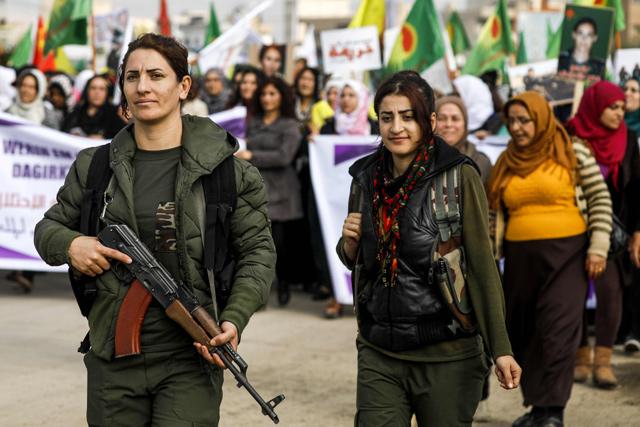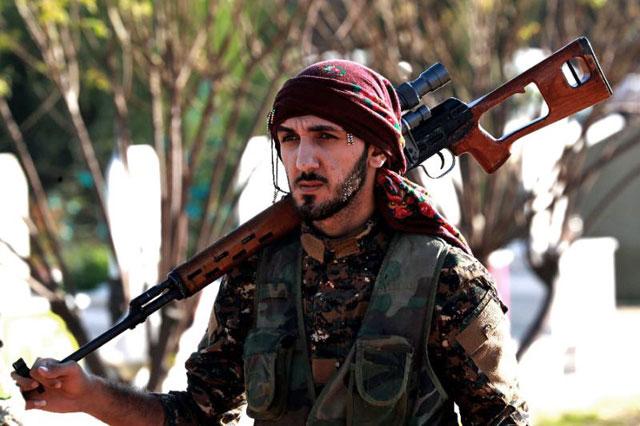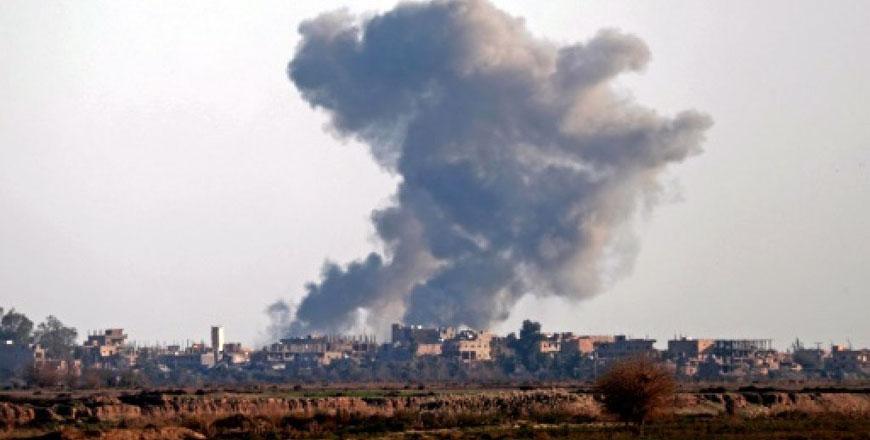You are here
What is stalling the fight against Daesh in east Syria?
By AFP - Nov 28,2018 - Last updated at Nov 28,2018

A Syrian Kurdish woman fighter holds a Kalashnikov assault rifle while marching during a demonstration in the northeastern Syrian city of Qamishli on Sunday, as they mark the International Day for the Elimination of Violence against Women (AFP photo)
BEIRUT — The Daesh group has fiercely defended its last holdout in eastern Syria against a more than two-month military offensive by a Kurdish-Arab alliance backed by a US-led coalition.
After the Syrian Democratic Forces (SDF) alliance successfully expelled the militants from other parts of war-torn Syria, why is this latest battle in the far east taking so long?
Who is inside holdout?
Hundreds of fighters are believed to be inside the pocket, which lies in the oil-rich province of Deir Ezzor near the Iraqi border.
The US-led coalition has estimated some 2,000 fighters to be present in the holdout, which includes the towns of Hajin, Sousa and Al Shaafa.
According to SDF commanders on the front line, a great number of those combatants are likely to be non-Syrians.
The SDF has said it believes "major leaders" of Daesh are hiding inside the pocket, where most front line commanders are Iraqis.
Nicholas Heras, an analyst at the Centre for a New American Security, says: "A mini army of several hundred fighters... has been assembled by Daesh there, including some of its best snipers."
The Syrian Observatory for Human Rights, a Britain-based war monitor, says Daesh family members are also inside the embattled militants holdout.
Why tough Daesh fightback?
Daesh overran large parts of Syria and neighbouring Iraq in 2014, declaring a "caliphate" across territories it controlled.
But various offensives in both countries have routed the extremists from most of that land, crushing their dreams of statehood.
In Syria, the extremists saw their dominion shrink to an eastern pocket around Hajin, although they also have a presence in the country's vast Badia.
On September 10, the SDF launched an offensive supported by coalition strikes to expel Daesh from the Hajin patch on the Euphrates River's eastern bank.
Syria analyst Tore Hamming said that, after years of defeats, battle-hardened Daesh fighters in that last redoubt were likely determined to fight to the bitter end.
"They know that they will either be killed by an air strike, or captured and put into prison," he said.
"Daesh knows the area extremely well, having been operating there for more than five years now and arguably has some level of local support."
What are complications?
Analysts say the battle to expel Daesh from the Hajin pocket will be tough.
In recent weeks, the extremists have taken advantage of low visibility in bad weather to launch vicious counterattacks.
Under cover of sand storms, and using suicide bombers, they last month managed to reverse all SDF advances inside the pocket.
Most recently, Daesh fighters have burst out of the fog, killing 92 US-backed fighters since Friday, according to the observatory.
More than 450 SDF fighters have been killed since the start of their offensive on September 10, the monitor says, while more than 730 extremists have also died.
SDF spokesman Kino Gabriel said key obstacles to defeating Daesh included bad weather, and Daesh using "all types of weapons, car bombs, and civilians as human shields".
On the opposing side, the SDF is "using all its capacities including special forces, heavy weapons and all military units that are present", he said.
Heras said the remaining battle in Deir Ezzor would be "the most treacherous of the entire campaign" against Daesh.
"The SDF is relying on local Arab tribal fighters to wage the war against Daesh there, and these local fighters do not want to take casualties," the analyst said.
"Daesh has turned this area into a deathtrap, and the SDF's [local] fighters are well aware of this."
All this makes "the fight there slow-moving and tortuous, which is putting pressure on the SDF to hurry things up", he said.
The coalition remains optimistic.
"At this point in the operation, there are not enough Daesh [fighters] to make any significant or lasting gains," coalition deputy commanding general Christopher Ghika said on Sunday.
The coalition says Daesh has lost most of its financial resources, and is instead relying on improvised explosive devices and cave complexes "to retain their shrinking influence".
Related Articles
BEIRUT — US-backed Syrian fighters have broken into an eastern holdout of the Daesh group on the Iraqi border, a commander and a monito
HAJIN, Syria — Burnt-out cars, craters and collapsed buildings dot the side of a road in the Syrian village of Hajin, after US-bac
BEIRUT — The US-led anti-trrorism coalition hit back Sunday at reports its air strikes on a Daesh group holdout in eastern Syria had killed


















